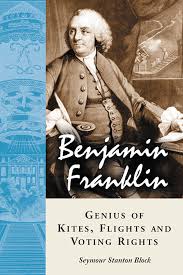Ben Franklin’s Kids
Listen to the Recess! Clip
| Author | John Cech |
| Air Date | 1/19/2005 |

Ben Franklin’s Kids Transcript
It was Ben Franklin’s birthday a few days ago, just the right time to pass along this information that we received from Seymour Block, who listens to these programs and is a neighbor and friend. Seymour is also an expert on Franklin and has written about him extensively, most recently in a book called Benjamin Franklin, Genius of Kites, Flights, and Voting Rights. Seymour is a professor emeritus of chemical engineering, but modestly claims that Franklin is “the only subject I know anything about.” According to Professor Block,
“Franklin was fond of children and got along very well with them. . . . He enjoyed their company and, in the case of his own children and grandchildren, he tended to be over-indulgent with them. . . . In his old age, when he was very ill in bed, a friend reported that when his grandsons were playing very noisily outside, he would open his window and call to them: “Boys, can’t you play without making so much noise. I am reading and it disturbs me very much.” The servants said he never used an angry word to any of them. Franklin is quoted as saying: “Children should be treated like strangers who arrive from an unknown country and must be politely taught the customs of ours.”
As an elder statesman, Franklin once found himself giving advice to the young daughters of friends about their choices of future husbands, and he even wrote a lengthy epitaph for a child’s pet squirrel (squirrels were generically called skuggs in 18th century America). The poem tries to make the best of the animal’s demise, and it ends:
Here Skugg
Lies snug,
As a bug
In a rug.
Franklin observed how boys would find all sorts of reasons to get excused from Sunday school, such as needing their shoes or their clothing mended and only announcing it at the last moment when the church bells began to ring for services. And he knew first hand how easily children could be duped out of their meager savings, as he once was when he was seven years old and paid four times too much for a toy whistle. He vowed never to fall into that trap again, and even wrote about the patient restraint that children and adults needed to find in themselves so that they didn’t rush into a rash purchase. Years later, however, he confessed that “with all this wisdome of which I am boasting, there are certain things in the world so tempting . . . if they were put to sale at auction, I might very easily be led to ruin myself in the purchase and find that I had once more given too much for the whistle.”